#pov: a blessing among misfortunes
Explore tagged Tumblr posts
Text
𝐚 𝐛𝐥𝐞𝐬𝐬𝐢𝐧𝐠 𝐚𝐦𝐨𝐧𝐠 𝐦𝐢𝐬𝐟𝐨𝐫𝐭𝐮𝐧𝐞𝐬, 𝔭𝔬𝔳.
: dizem que há sempre uma luz no fim do túnel, que o sol eis de brilhar após uma tempestade. mas e se, só... e se, o que vier for apenas sombras em ilusão?
quando: quase um ano atrás.
trigger warning: menção a assassinato.
disclaimer: um extra dessas sequências um & dois.
o retorno ao acampamento fora de um completo silêncio. a mente estava apegada ao que havia feito e não tinha motivos para compartilhar da sua vingança com alguém; talvez, ninguém soubesse percebê-la de fato, compreendê-la. muitos apenas aproveitariam para seguir a rotulando como um monstro, mas katrina era apenas corajosa. havia alcançado seu objetivo, mesmo que agora parecesse sem propósito algum. quando deitou-se na cama, pela primeira vez em anos conseguira pegar no sono, não um adormecer tranquilo, porém, o bastante para levá-la a outro lugar. mas a utopia lhe esperava com uma surpresa, o corpo enrijeceu sentindo a presença de algo em meio a inconsciência, olhos escuros a perseguindo por entre as portas de um corredor sombrio, mãos gélidas lhe atravessando a alma, revirando seus segredos.
ainda dormindo, presa no que parecia ser um sonho, voltou para o momento em que havia matado aquele homem. o viu sangrar, implorar por ajuda enquanto deleitava-se com tudo aquilo; voltou ainda mais para trás, o corpo vagando entre o que havia perdido, seu grande amor sendo morto ainda muito jovem. e voltou muito mais, voltou para quando havia sido expulsa de casa, para o sentimento de ódio que a tomava, como desejava vingança. e mesmo que não tivesse plena consciência do momento, retornou para a primeira idade, era apenas um bebê no colo da deusa éris, esta a deixando na frente de uma porta, a abandonando para seu destino.
katrina remexeu-se, agoniada demais, desejando liberdade; contudo, uma voz sobressaltou-se, uma mulher que se escondia nas sombras. ، pobre criança, tão desafortunada... a dela cruz forçou a visão, apertando os olhos para que reconhecesse alguma silhueta dentre a escuridão. não fora preciso, a deusa avançou dois passos em sua direção, revelando a sua persona. ، nêmesis. a reconheceu, sentiu a força que emanava dela. ، há tanto potencial em você, minha jovem. há tanto pelo que deseja se vingar. aquela era a primeira vez diante de uma deusa, e ao contrário do que havia imaginado ou falado, katrina tinha vontade de curvar-se, de mostrar respeito; era como se todo o corpo fosse forçado a ir na direção dela. ، por seu ato, lhe concederei minha benção, mas prometerá a mim que não se acomodorá, que seguirá levando sua vingança para aqueles que merecem. não soubera com certeza mas ela parecia sorrir. ، promete? o que poderia dizer? queria negar aquela benção, não precisava de favores, não precisava de nada que viesse de um olimpiano. ، prometo. disse antes que algo a tocasse, era como um fogo a queimando mas era bom. forte e poderoso enquanto a percorria, a moldava.
quando acordou katrina não sentia-se diferente em nada, mas sentia na alma o toque da deusa da vingança.
benção de nêmesis: após se vingar de alguém do seu passado, o matando em nome de um grande amor, a deusa da vingança concedeu a katrina uma benção. a semideusa se envolve em sombras e desaparece da visão, permanecendo invisível até realizar uma ação hostil e ser revelada. no entanto, a benção só funciona se caso houver uma sombra, em dias de muita claridade ou ausência de escuridão no ambiente, não consegue se camuflar.
#vii. from dark paths. ヽ ❪ 𝐏𝐎𝐕 ❫ * ヽ#pov: a blessing among misfortunes#só pra contextualizar a benção da gatah
15 notes
·
View notes
Note
For the WIP game, The Newcomer one sounds so cool!! I'd love to hear more about it!
Heavy spoiler warning for Heaven Official's Blessing. Hi! Right, so, The Newcomer. I came up with the idea around two years ago, while re-reading the Ghost City arc. Do you remember how the mortal who's betting against Hua Cheng when Xie Lian arrives uses his daughter's lifespan and fate in marriage as a wager? It established fortune/fate as a sort of currency in the world of TGCF, a notion that later got reinforced by things like:
-How Hua Cheng can transfer luck in games of chance to Xie Lian -How Shi Wudu could use He Xuan's divine fate to make Shi Qingxuan ascend instead -How Jun Wu physically took Xie Lian's fortune away from him with the second shackle and scattered it among mortals (or so we hope, because Xie Lian asked for that to happen, but with Jun Wu, you never know) -How Jun Wu can put his resentment to bake in the Kiln and cook curses of horrible misfortune with it, which was what made Hong'er's brief life so miserable
The whole thing is quite intriguing. Does the Gambler's Den have a vault of good and bad fortunes in different areas of life, that they've been hoarding for centuries in order to offer them as rewards to new patrons? How, where, and from whom did Hua Cheng learn the magic required for such a thing? Does part of his extremely good luck come from gambling earnings, or is it all his, and the house has its own separate reserves? Is there anyone able to audit these transactions and confirm that there's no cheating and everybody involved gave their informed consent, which seems to be the requisite for the magic to work without breeding resentment (as opposed to a stolen fate, like the Blackwater case), or do they have to believe in what Hua Cheng says because he's too strong to be opposed or challenged?
If I have those questions, surely some characters in the story could have them too. Cue the new Earth Master, formerly an overseer of a big mining operation at the service of the Chinese empire, who swears that he was coerced into betting his extraordinarily auspicious fate in marriage in the Gambler's Den, and claims that Hua Cheng used it to marry Xie Lian, because otherwise there's no way "any respectable god would agree to marry such a vile monster." He ascends shortly after Hualian get married, which in turn is not too long after Hua Cheng's return. Many gods are still resentful towards Hua Cheng for his past deeds and the fanfare of the bells singing him praises every day, so they rally with the new Earth Master to see if they can take him down. Naturally, Xie Lian doesn't believe any of it for even an instant. He's devastated by the turn of events, and when he's told that he should not only stay away from the case because he's biased, but also stay away from Hua Cheng altogether until they determine if their love is legitimate or the product of a fate switch, he almost gets into his second calamity era and locks himself in Paradise Manor, refusing to leave until the case is closed (he's too strong for anyone to force him out, so at least there's that).
As I mentioned, Ling Wen takes on the case to get some fresh air and see if that can get her out on parole. She's in terrible terms with Hua Cheng, but I think she's too pragmatic to try to use the chance to get back at him. Instead, I think she'd be genuinely interested in finding out whether the old fox is as cunning as people paint him to be.
That's what I have defined so far. The rest is rather nebulous because there are a lot of possibilities, both in regard to what actually happened, and also in regard to the POV(s) I want to focus on. I could stay with Ling Wen and show how the Earth Master mirrors the men who looked down on her and mistreated her through her life, or I could focus on Hualian, or do a mix of both... I have started the story two or three times, testing the waters, but I'm still unsure.
Thanks for asking!
——————
Back to WIP game main post.
17 notes
·
View notes
Text
The Guild Arc and some Major Themes
The aim of this meta is not to give a full analysis of the Guild Arc, but merely to use said arc to discuss some major themes the arc introduces/explores and some characters linked to them. Because of that the analysis will concentrate only on a bunch of characters and themes without worrying about other crucial ones.
To be more specific the characters explored here will be the following.
1) Atsushi and Lucy
2) Mori
3) Kyouka
Some considerations will be made also about other characters and the final paragraph will discuss some events happening in the current arc.
ATSUSHI AND LUCY: LONELINESS AND IMAGINATION
The war among the Guild, the Mafia and the ADA is opened by the fight in Anne’s room which is important on several levels.
First of all, this fight highlights Lucy and Atsushi’s similarities:
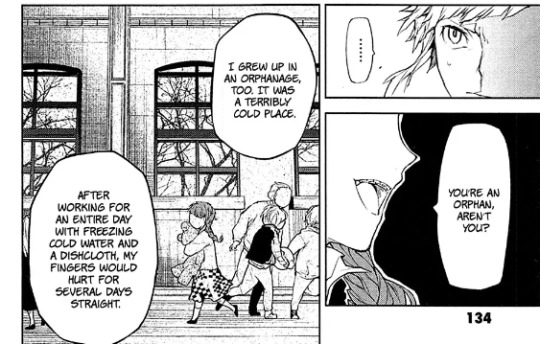
Both are orphans and have found a new place in the world thanks to their abilities. At the same time, they obviously hate their abilties to an extent:
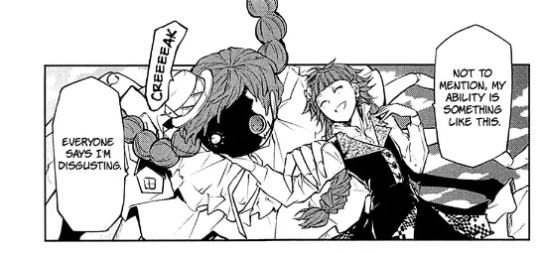
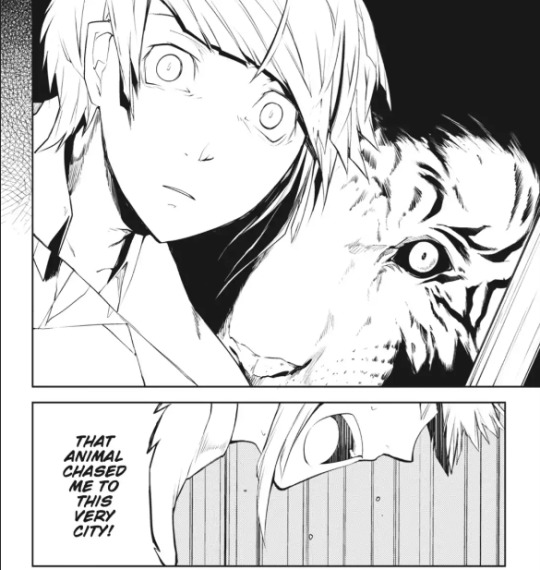
One of the main points of Atsushi’s arc is that he can not completely accept the violent parts of himself symbolised by the tiger. He has been refusing this side of himself so much that he was not conscious of it until Dazai revealed the truth to him.
Lucy’s ability is highly symbolic as well.
As a matter of fact Anne is clearly an alter-ego of Lucy herself. On one hand she is stronger than Lucy and will fight for her. On the other hand she also looks monstrous and scary.
These two attributes represent the fact that Lucy’s way of coping with her loneliness is a double-edged sword.
This is because Lucy’s solution is to basically find a refuge in her own head represented by her “room”. The room is a place where Lucy has basically complete control over things and where she can be the strongest, whereas in the real world she is weak and bullied.
However, no matter how strong she is in this world of her creation, she is bound to remain lonely exactly because she refuses to escape her own head and to truly connect with others. She chooses to bring people in by force instead and forces them to stay with her by catching them and collecting them as if they were dolls.
This is why what Atsushi tells her is important:
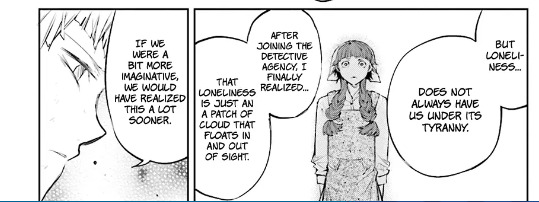
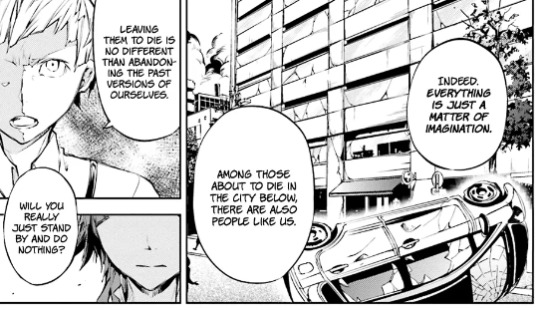
Loneliness is a matter of imagination because it is a feeling rooted in the perception of one-self and of others. Both Lucy and Atsushi used to feel different and worse than others, but the truth is that all people have similar feelings and the point is realizing this.
For example, this is what happens to Atsushi when he is targeted by the mafia and leaves the Agency because he is sure he will bring only misfortune to them. However, he quickly realizes that what happens to the members of the agency is not something for him to decide since 1) the mafia still chose to attack them and 2) they were strong enough to defeat the mafia:
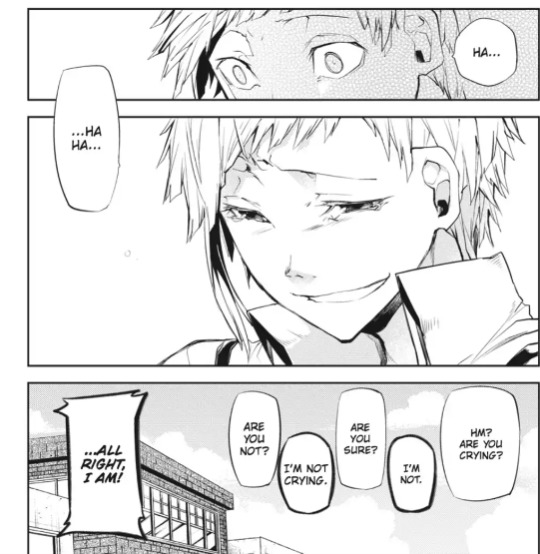
Here, maybe for the first time ever, Atsushi feels that not everything is on his shoulders and depends from him. Because of that, he is able to move on and later on he is able to help Lucy do the same.
All in all, their battle in Anne’s room is nothing more than a fight to force Lucy to open her mind:
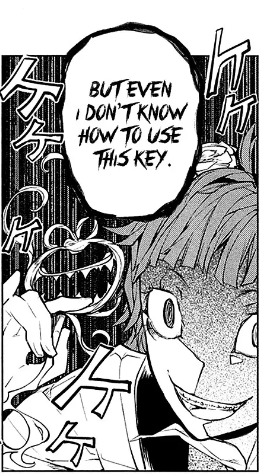
As Lucy herself states she doesn’t know how to use the key because she doesn’t know how to healthily communicate with people and is not able to open herself up to others.
Of course the point is that in the end there is no magical key, but only Lucy herself can choose to go out from her mind:
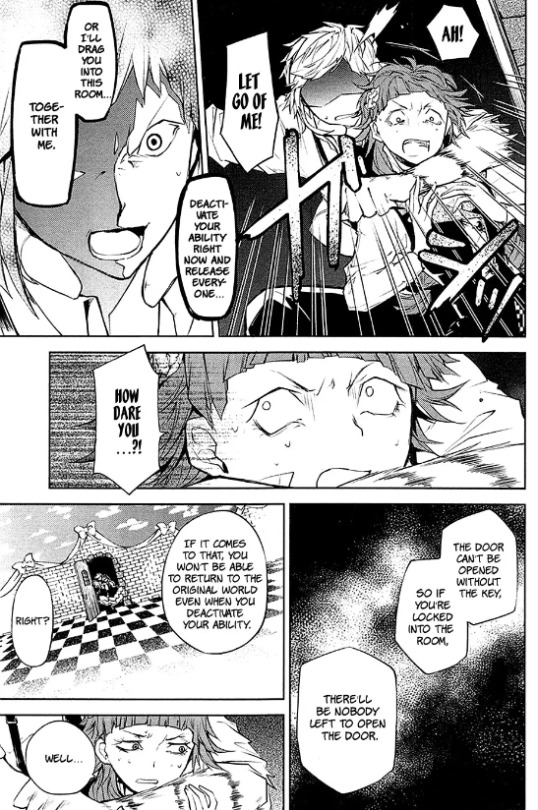
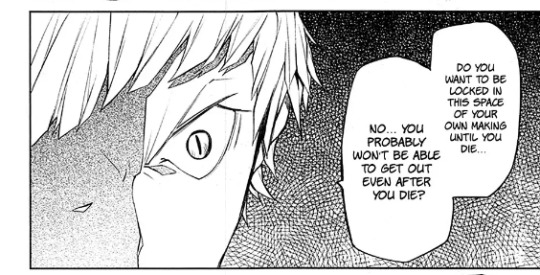
The result is that she is able to move on and to genuinely connect with Atsushi when they meet again. Atsushi shows her that there are other people like her and that if she understands this, she may be able to create bonds with others. This is why during their second meeting this exchange happens:
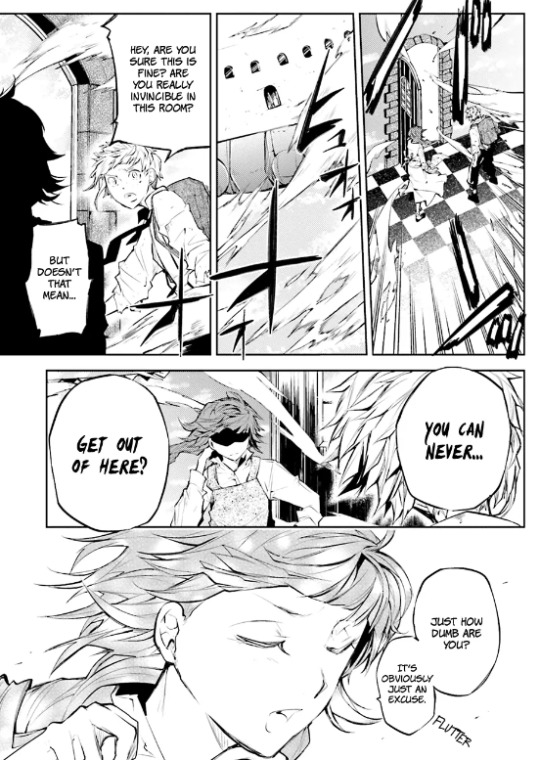
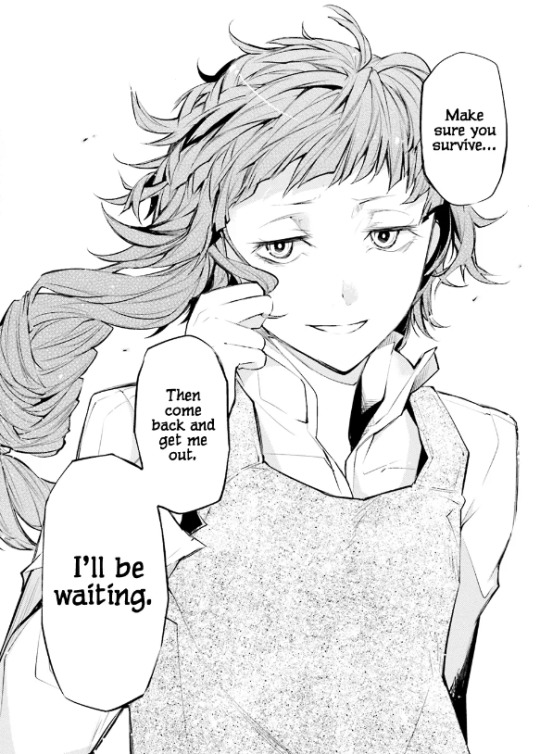
Lucy can’t stay in her room forever and this is why she asks Atsushi to come back for her. Basically she has accepted that she needs to connect with others and chooses to trust Atsushi.
This is interesting because, after her development, it turns out that Lucy’s ability is at its best when used to help others:
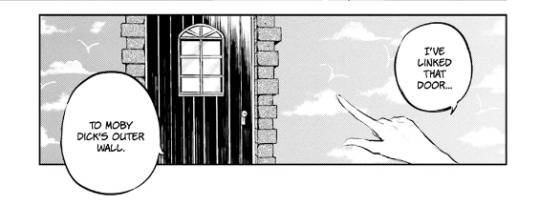
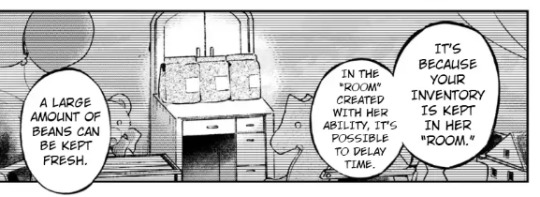
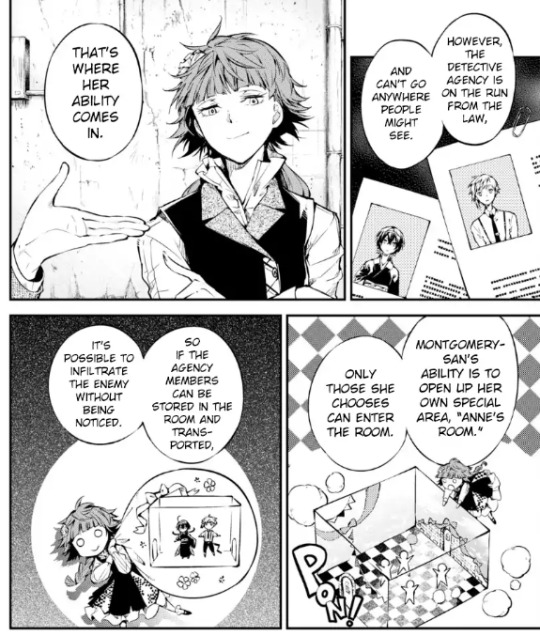
In the end, the true value of her power did not lie in Anne’s strength or in using it to kidnap people, but rather in letting people escape boundaries (the ability is used to overcome the effects of time, to let Atsushi escape a room and to let both him and Kyouka move around despite being wanted). This is something which fits the idea of Lucy’s ability representing “an escape into one’s imagination”. After all, what does imagination do if not letting people escape boundaries? Lucy used it to isolate herself, but once she starts sharing her power with others, she becomes more powerful to the point that she is considered Dazai’s queen in the current arc.
At the same time, in her second meeting with Atsushi, Lucy points out something important:
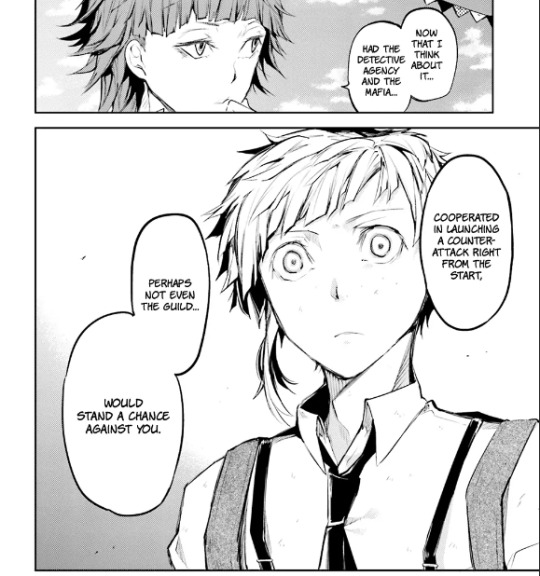
It is not a mystery that Atsushi’s development lies into accepting his negative traits, so that he can overcome the hero complex the orphanage director made him develop. This hero complex is built on the assumption that Atsushi is worthless and has a right to live only if he helps others and is a good person. This way of thinking is obviously detrimental and may lead Atsushi to self-destruction.
The story has made very clear so far that to overcome this mindset Atsushi needs to reconcile with Akutagawa. I am not going to talk much about it here and I am simply linking two metas on Atsushi and Akutagawa’s relationship. They were made by @hamliet (this) and by @linkspooky (this).
The point is that Akutagawa represents everything Atsushi doesn’t want to accept about himself (the violence, the possibility of being left behind, how pathetic and wrong it is to let one’s worth being decided by others’ praise etc.). At the same time Atsushi is the same for Akutagawa.
Moreover, Atsushi and Akutagawa are also complementary as Dazai explains here:
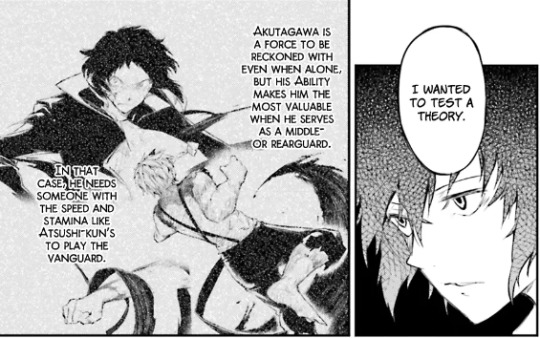
However, their complementarity should not be considered only on a functional level, but also on a symbolic one.
On one hand Atsushi’s ability lets him turn into a beast he is scared of and can’t control. He literally hides the tiger from both others and himself.
On the other hand Akutagawa transforms his coat into a beast and so he projects a violent persona.
Atsushi hides his aggressiveness, whereas Akutagawa wears it proudly and hides his vulnerability.
In short, they are both the same and opposite and this is why they can’t stand each other. This is also why they balance each other like yin and yang:
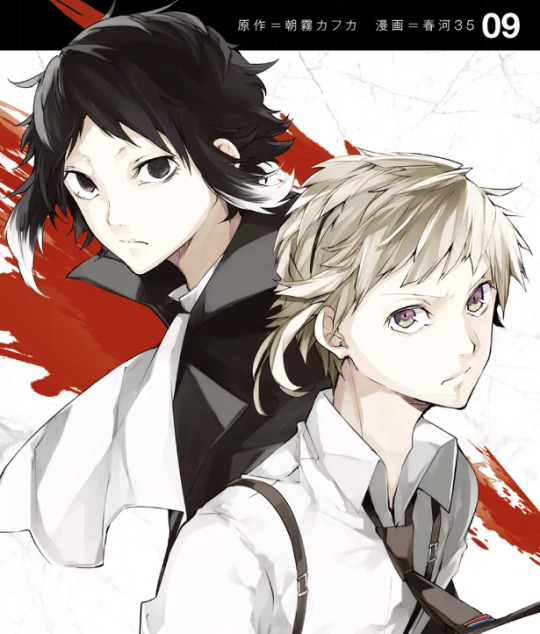
Now, let’s consider this:
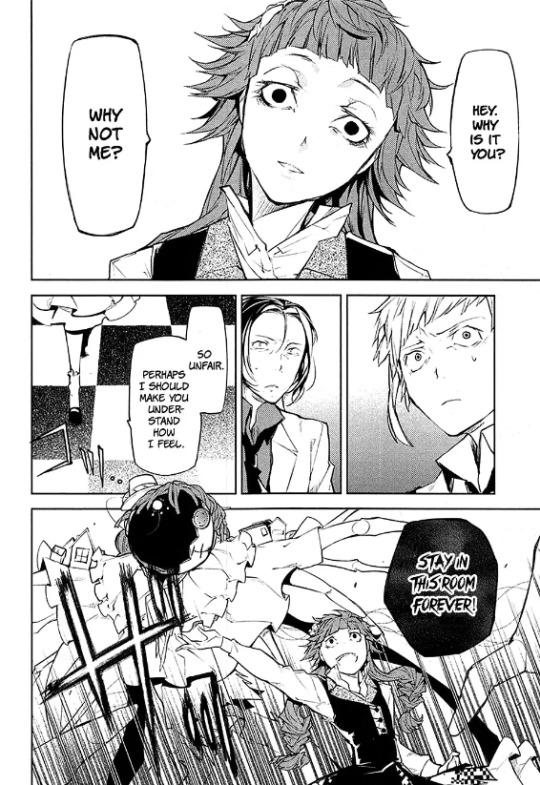
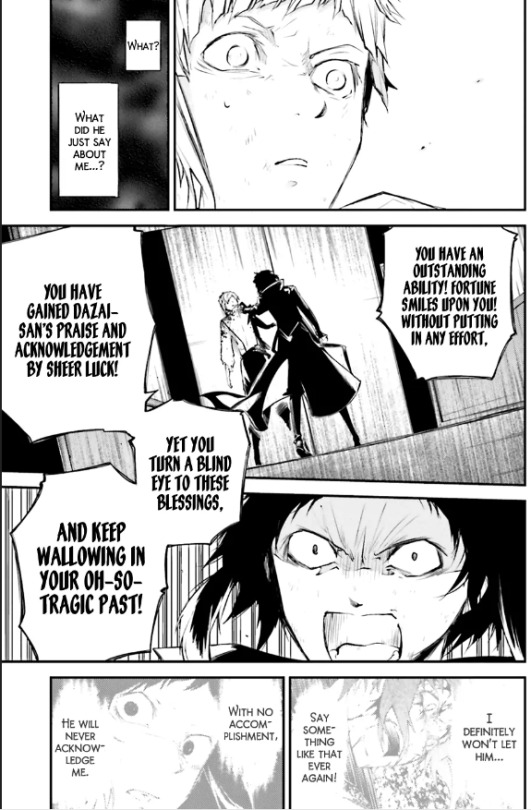
It is obvious that Lucy and Akutagawa have a similar attitude when it comes to Atsushi in the sense that they are both envious of him. They think that Atsushi is blessed in ways they are not despite how similar they are. Atsushi is an orphan and an ability user like them, but despite this, he is receiving love while Lucy and Akutagawa are trapped in unhealthy environments where they constantly need to prove their value if they don’t want to be tossed away. They have also both lost against Atsushi once and have important moments with him while on Moby Dick.
In short, both Lucy and Akutagawa are there to remind Atsushi of his past self and they both need Atsushi to develop. Atsushi is struggling when it comes to his relationship with Akutagawa, but has successfully managed to get through Lucy and to influence her. So it makes sense that she has done the same for him. What is more, Lucy’s contribution to Atsushi’s arc has consisted in making him realize a very simple truth aka that if the ADA and the mafia join forces they can easily defeat the Guild.
This is something obvious, but Atsushi never considered it because he associates the mafia with something bad. This is obviously because of his bad experiences with the organization. However, even if the mafia is destructive and is surely not a noble organization, they can still be of help:
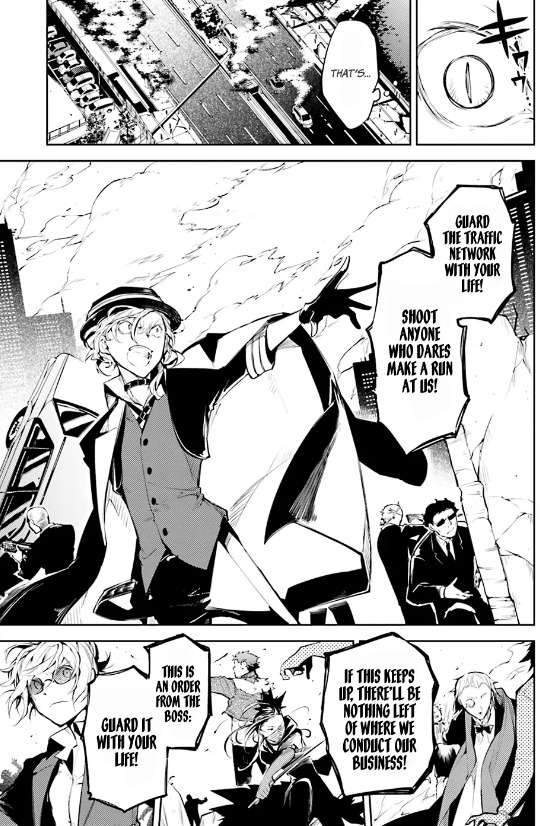
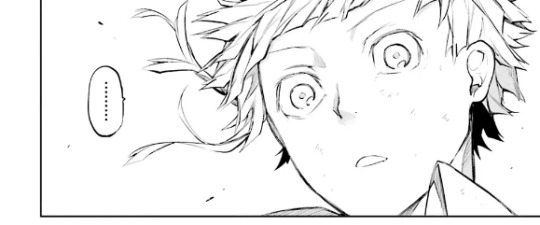
It is not by chance that Atsushi has this realization while falling from the sky and so while he is observing things from an unusual perspective. As a matter of fact this simply adds to the symbolic change of POV he is experiencing and which has been triggered by Lucy.
At the same time, it is interesting that just after having this realization he is able to successfully control the tiger and to turn into it completely for the only time so far in the story:
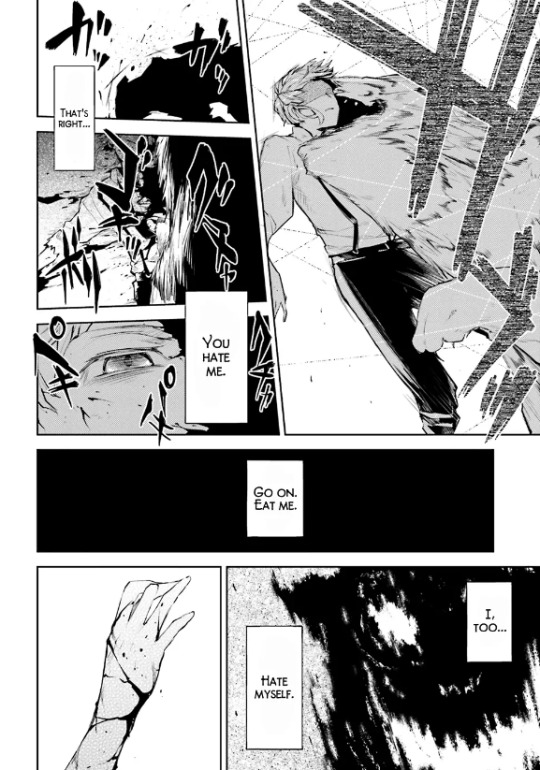
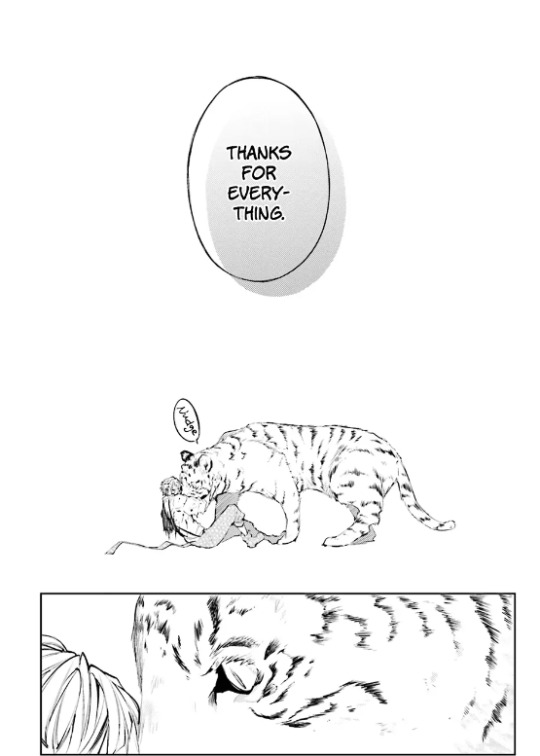
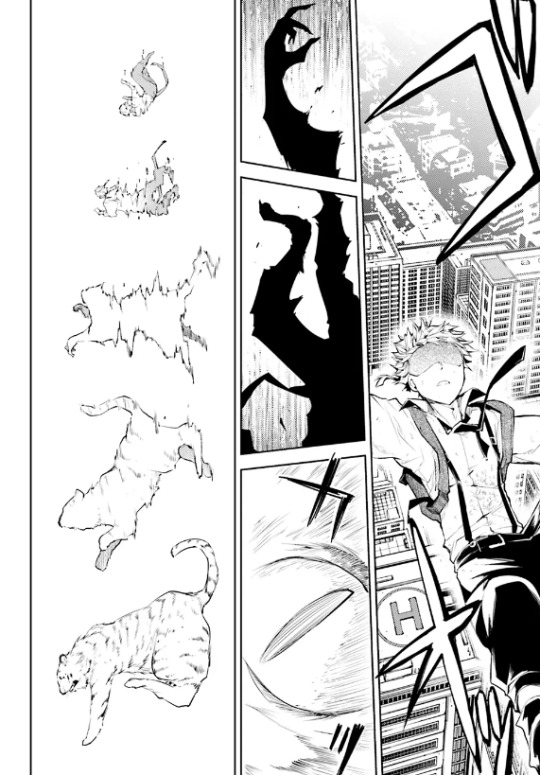
This scene summarizes Atsushi’s need to overcome his self-hate and to accept his power which is violent, but has also helped him to survive so far.
This acceptance will mostly happen through Atsushi’s acceptance of Akutagawa at one point. At the same time, on a macro level, the story needs a resolution of some type between the Mafia and the Ada since it is obvious that the two organizations are linked because of the past of many characters in the ADA being linked to the mafia somehow. Dazai, Yosano and Fukuzawa all have a past which involves one or more members of the mafia, for example.
In short, when it comes to Atsushi’s personal journey, him proposing to work with the mafia is a step in the direction of accepting his less noble parts.
Of couse, Atsushi’s wish to work together with the mafia is not so easy to realize both when it comes to Atsushi himself (he has still to settle his conflict with Akutagawa) and when it comes to others as well.
The difficulty of this integration when it comes to the two organizations, rather than to Atsushi as a character will be explored in the next part of the meta.
MORI AND GAME THEORY
Another important thing which happens during the battle in Anne’s room is Mori’s introduction:
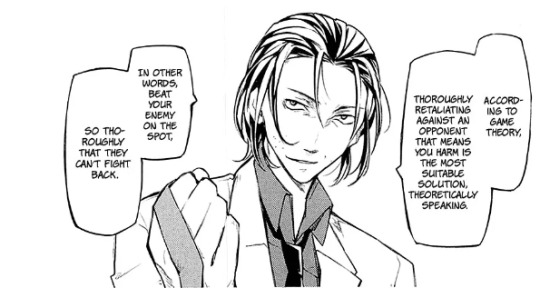
He is immediately associated with Game Theory.
In short, Game Theory is a discipline born to study human conflicts through a mathematical and abstract approach which involves mental games.
One of the most famous of these games is the Prisoner’s Dilemma:
Two members of a criminal gang are arrested and imprisoned. Each prisoner is in solitary confinement with no means of communicating with the other. The prosecutors lack sufficient evidence to convict the pair on the principal charge, but they have enough to convict both on a lesser charge. Simultaneously, the prosecutors offer each prisoner a bargain. Each prisoner is given the opportunity either to betray the other by testifying that the other committed the crime, or to cooperate with the other by remaining silent. The offer is:
If A and B each betray the other, each of them serves two years in prison
If A betrays B but B remains silent, A will be set free and B will serve three years in prison (and vice versa)
If A and B both remain silent, both of them will serve only one year in prison (on the lesser charge).
Given this dilemma, the most logical thing for an individual to do is to betray their partner no matter what. As a matter of fact, if they betray their partner without being betrayed the person will be free, whereas if both betray each other the person will still avoid the three years penalty which is the worst possible scenario. This is called a defeatist attitude. However, the prisoner’s dilemma also suggests that if both players were to cooperate (and so did not betray each other) their individual gains would be better than the ones they get when they both defeat (aka they betray each other). This is called a cooperative attitude.
This dilemma, or at least the core idea behind this dilemma (aka the choice between cooperation and defection) is important for the resolution of the Guild arc and for Mori’s character especially.
As a matter of fact it is clear that Mori is a defeatist:
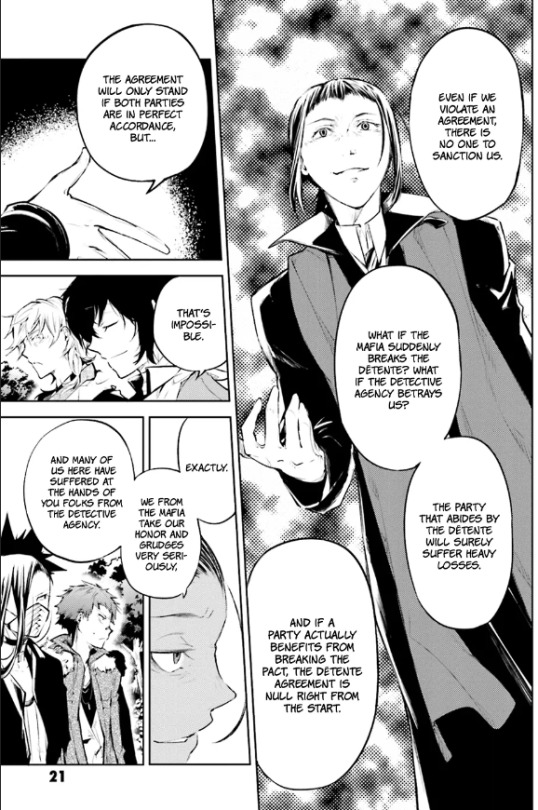
This is a very clear explanation of why a defeatist approach is considered the best when it comes to individual gain. By being a defeatist in a prisoner dilemma (and in some other similar dilemmas) one is sure not to lose when compared to others.
However, what is interesting is that this approach puts individual gain before the common one and this clearly shows how much of a contradictive character Mori is.
As a matter of fact, Mori’s philosophy is summarized here:
“A leader is both the head of the organization and the organization’s slave. For the survival and profit of the organization, they gladly put themselves through any manner of filth. They develop their subordinates and put them where they best fit and, if necessary, they use and dispose of them. (...) All for the organization and for the protection of this beloved city.”
He argues that he is acting for the greater good and that he is ready to sacrifice people and to be cruel to protect Yokohama. However, in the scene before he is embracing an attitude which (by default) gives priority to an individual or a group over society.
This is because, as the chapter A Tower of Silence, A Feast of Crows explores, Mori is actually thorn between opposite feelings:
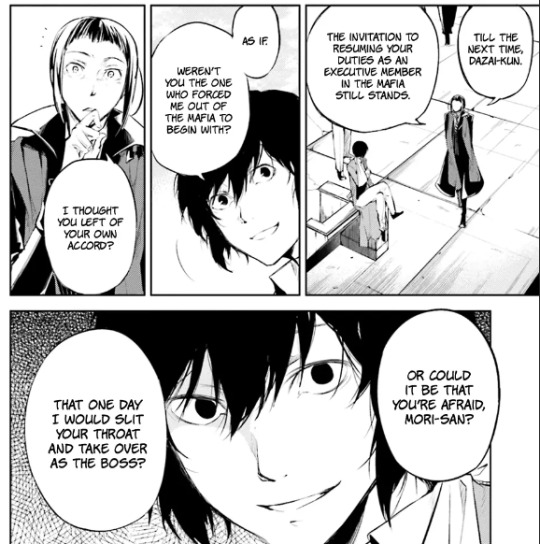
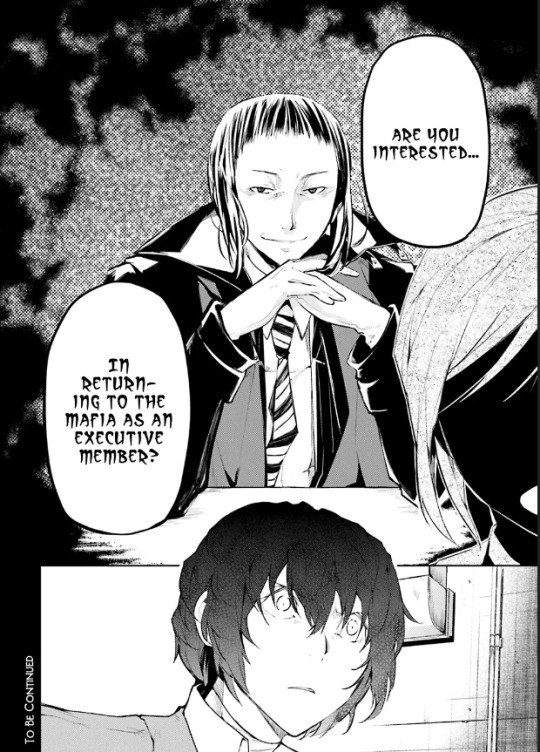
On one hand Mori manipulated the events of the Dark Era’s arc to have Dazai leave the mafia. On the other hand he has also asked Dazai to come back to the organization as an executive.
These two behaviours are opposite and underline an inconsistency. Mori should either want Dazai to stay away from the organization because he could kill him or Dazai to come back as an executive. He should not wish for both things since it is not logical. However, he keeps wavering between the two:
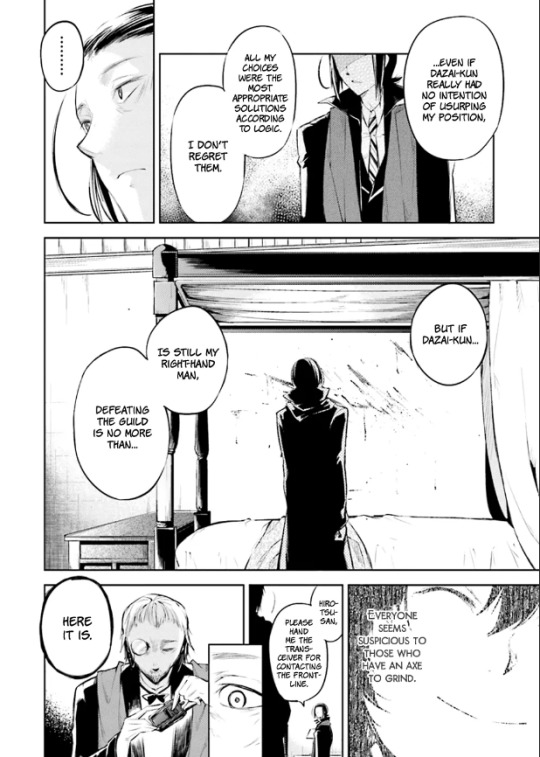
He affirms he has no regrets over his past actions, but a second later he says something which implies he has. All in all, Mori’s motivations to agree to a temporally alliance are not rational, but emotional. Firstly, he makes the decision and only later he rationalizes it:
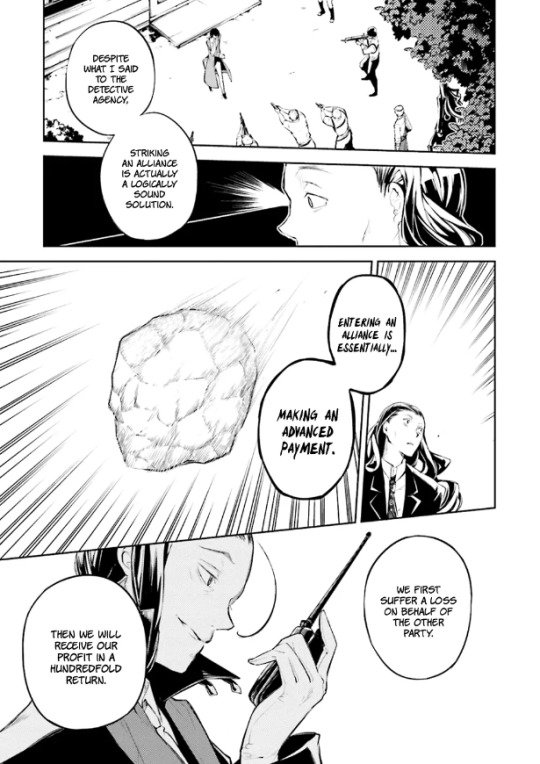
This is shown also by the fact that Mori’s contribution to the “alliance” between the mafia and the ADA is not really to give the other organization full support, but merely to re-create a specific partnership he himself had wanted and to which he is clearly emotionally linked to an extent. All in all, Mori acts out of nostalgia.
In short, even if Mori is said to be the embodyment of logic and he justifies his misdeeds (both to others and to himself) as necessary to obtain greater results, he has an emotional side which clearly influences his decisions both for the better (accepting a temporary alliance) and for the worse (killing Odasaku to drive Dazai away).
However, this “emotional” side of Mori has at least two major problems which are symbolically represented by his ability.
Mori’s ability is called Vita Sexualis and it lets him create Elise. I would like to interprete this ability in two ways which are interconnected.
1) First of all, as others underlined, the fact that the entity created through an ability called Vita Sexualis is a child is symbolic of Mori’s willingness to pray on weaker people and of his inability to care about another person in a healthy way.
This is shown many times when more focus is given to Mori’s relationships. He became fond of Yosano because of her ability, projected his own issues on Dazai and groomed him, forced Chuuya to join the mafia because of his strength. He justifies all these actions by saying that he is trying to obtain beneficial results for everybody else, but what becomes clear is that Mori sees others as tools even when he develops some kind of twisted attachment to them:
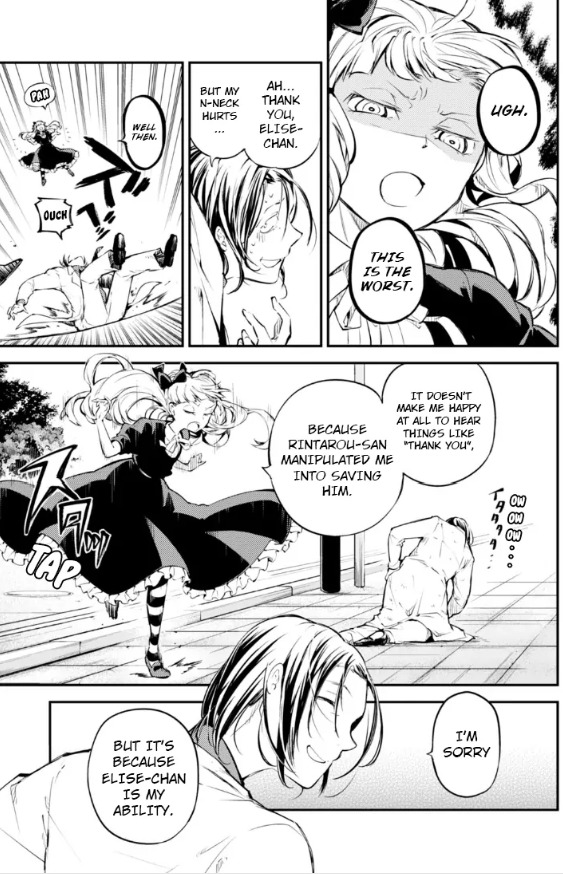
Here, Elise is annoyed because she states Mori is the one who forced her to save him. Basically she is saying that she has no freedom and this summarizes how Mori organizes his own relationships with others. He manipulates them and tries to control them exactly like he does with Elise.
In short, Elise is a metaphor of Mori’s twisted attachment to others and of its unhealthy aspects.
2) Elise is called after a character of The Dancing Girl which talks about a Japanese student in love with a German dancer. The main character must choose between her and his career and in the end he chooses the latter leaving the pregnant girl behind. As a result the girl has a nervous breakdown.
I think the plot of this short story fits Mori pretty well since he is said to be ready to sacrifice his sobordinates to reach his personal objectives.
In conclusion, I think Elise perfectly shows Mori’s attitude towards attachment and personal relationships. He might potentially be able to develop them, but he chooses to completely manipulate and control this part of himself (which remains underdeveloped like a child) and even to discard it in order to reach his objectives.
Finally, I would like to highlight that Atsushi’s reasons to demand an alliance and Mori’s ones to accept it are outlined in two consecutive chapters called after two quotes by the two respective authors.
This is interesting because it lets us build a comparison between them.
On one hand Atsushi represents the future. He is inexperienced, but he is ready to try new things without regrets.
On the other hand Mori represents the past. He is part of an older generation and has some regrets about his past, but will refuse to properly face them and will keep hiding behind a mask of logic and utilitarianism.
Atsushi claims that the head may herr, but never the blood, whereas Mori strongly refuses this philosophy and keeps offering apparently logic arguments to preserve himself. These approaches are opposite and can’t be reconciled. At the same time they highlight another thing.
One of the reasons why the integration between the two organizations and in general among the different sides of Yokohama is so difficutl is not only because of the characters’ personal problems (unwillingness to cooperate, old grudges etc.), but also because the younger characters who have the best chance to change things find themselves in a flawed system they inherited by older characters.
All in all the series explores the theme of having to deal with the consequences of one’s parents’ actions (both negative and positive) and the characters all need to make themselves independent from parental and mentor figures, so that they can become their own people.
KYOKA AND A PARENT’S LEGACY
When it comes to the struggle of overcoming one’s parents’ legacy many characters could be discussed.
For example, Akutagawa and Atsushi’s conflict is basically built on them projecting the complexes they acquired because of their respective mentors on each other.
Similarly, even older characters like Ranpo, Yosano, Chuuya, Dazai and even Mori and Fukuzawa have to deal with parental figures.
However, among all the characters, I think the best suited to explore this theme from a symbolic point of view is Kyoka.
Kyoka is (together with Kenji) the youngest member of the agency and it is generally one of the youngest characters of the series.
What is more, Kyoka has been influenced by both Akutagawa and Atsushi:
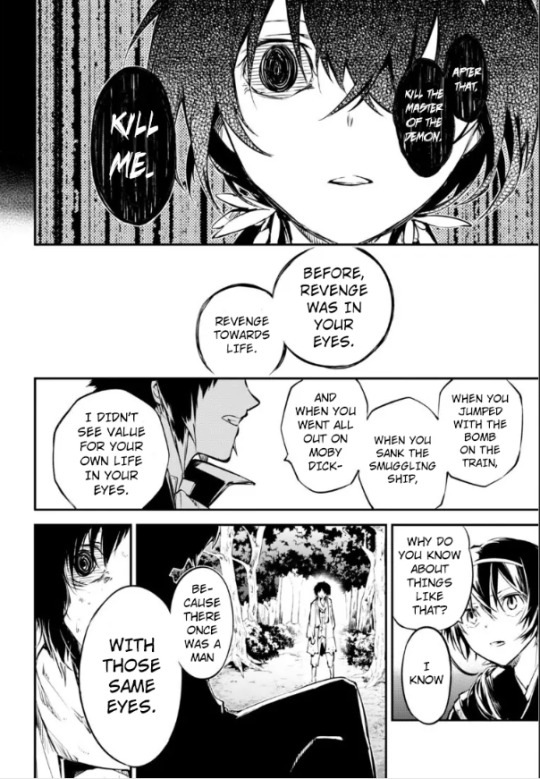
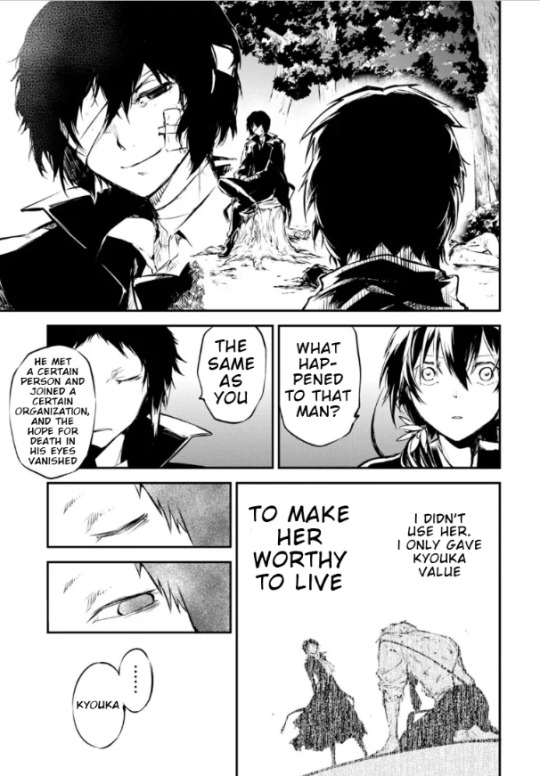
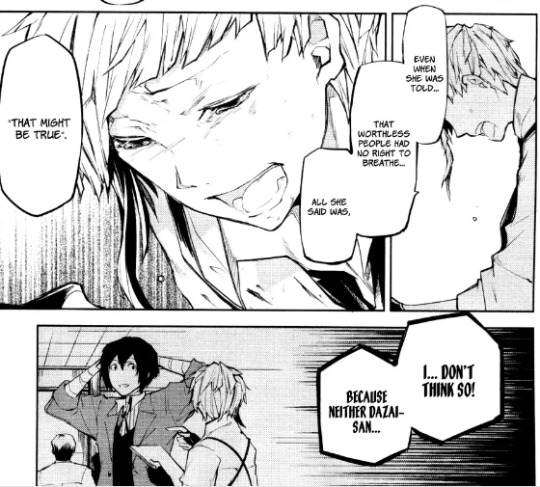
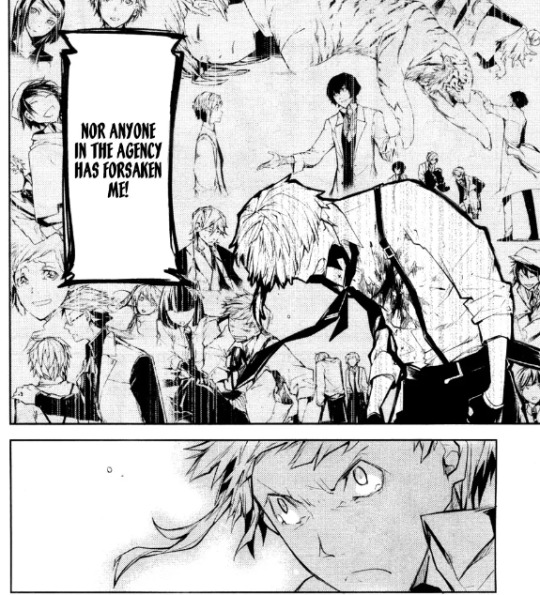
Both Akutagawa and Atsushi have been trying to give her a reason to live and in doing so they have both imitated Dazai.
Dazai linked Akutagawa’s sense of worth to his strength, so Akutagawa did the same to Kyouka hoping that this would have given her a reason to live.
Since Kyoka attempted suicide at the beginning of the series, it is obvious that this approach did not work.
Atsushi on the other hand was saved by Dazai even if he saw himself as worthless. So he does the same with Kyoka and gives her a taste of a new possible life.
In short, it is as if Kyoka has experienced both sides of Dazai through Akutagawa and Atsushi. Both methods have been attempted with her and maybe it is exactly because of this that Kyoka needs Dazai’s encouragement to break free from her belief that she is no good:
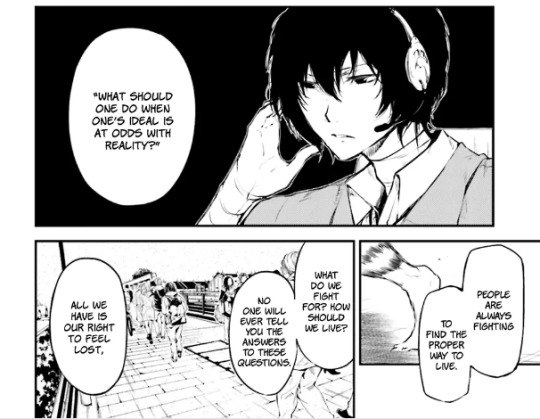
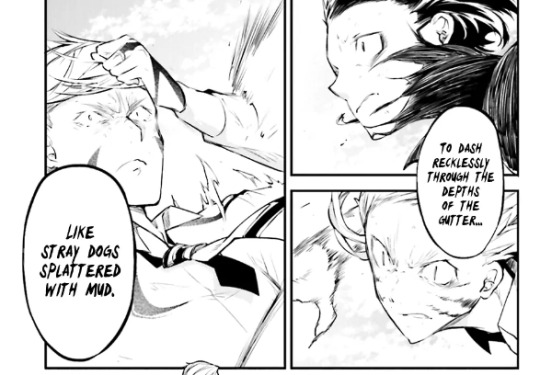
These words are symbolically said while both Akutagawa and Atsushi are fighting against a common enemy to save the city. Kyouka knows them both and must find her own personal way to live which is probably a synthesis between theirs.
Because of this, she is also in the perfect situation to understand them both and we were shown hints that she does:
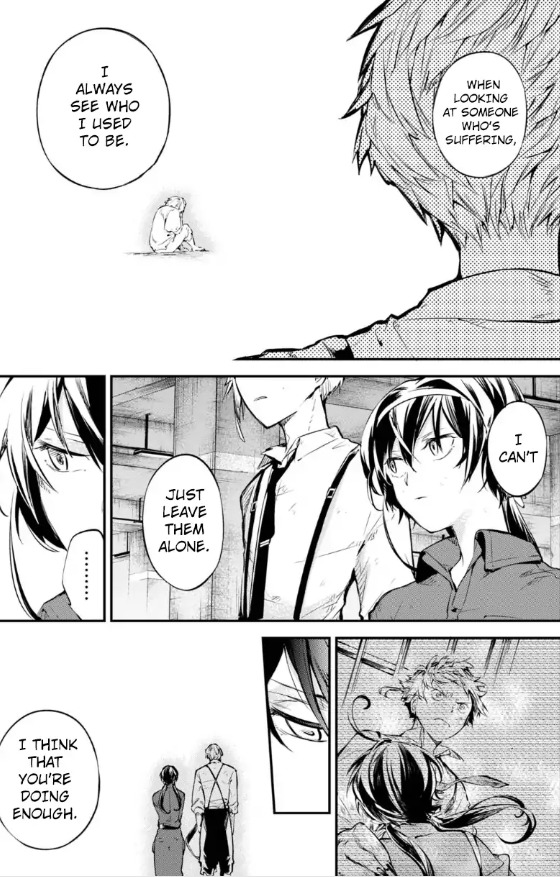
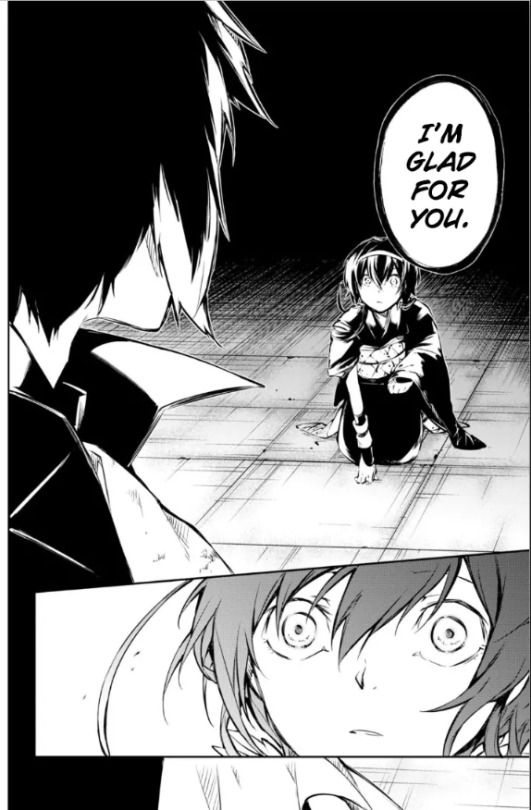
She is starting to see the true reason behind Akutagawa’s cruel behaviour and the unhealthy ones behind Atsushi’s noble one. She probably understands both and because of this she is also able to see their limits.
Having to deal with positive and negative aspects of one’s upbringing is also at the root of Kyoka’s ability.
Demon Snow is an inherited ability. Kyoka’s mother transferred it to her daughter before dying. In other words, the demon is nothing more than a legacy and it has both positive and negative traits linked to Kyoka’s parents themselves.
1) Demon Snow is associated by Kyoka to the act of killing. As a matter of fact the demon killed her parents and later on she is turned into an assassin by the mafia because of this ability.
In other words the demon symbolizes her talent as an assassin which she both has and despises:
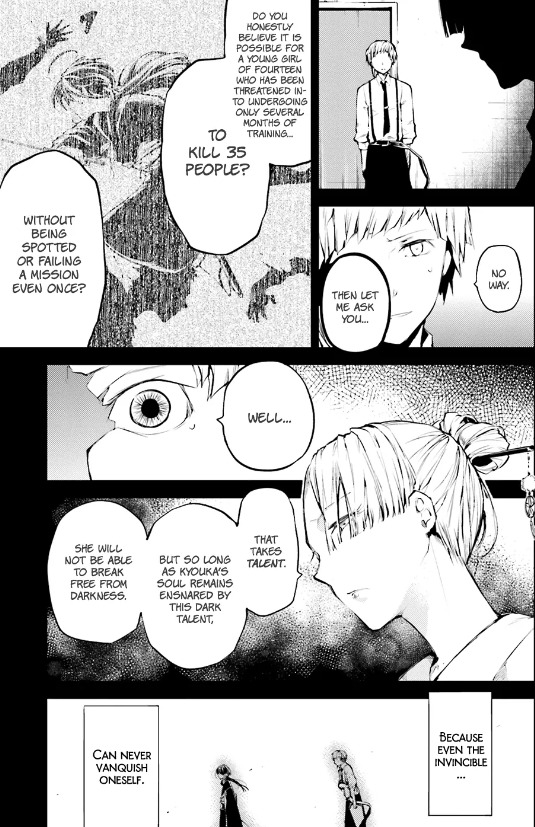
However, it is later revealed that Kyoka’s own father used to work as an assassin and her mother was at least part of this violent world as well. So, in a sense, Demon Snow is a symbol of this side of Kyoka’s parents.
2) Demon Snow is also an embodyment of her parents’ love:
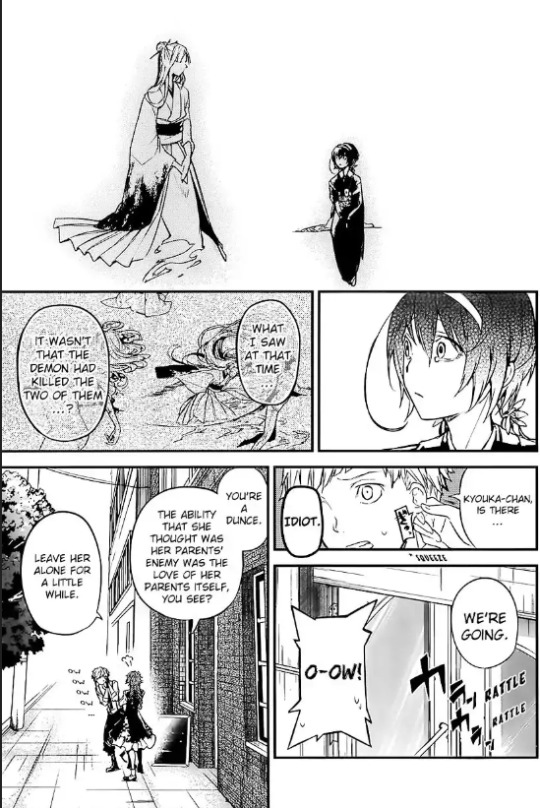
As a matter of fact both her parents chose to die in order to protect Kyouka and her mother gave her the demon, so that she could be protected by it.
In short, the demon itself is a complicated legacy Kyoka has to struggle with. On one hand her parents loved her and did the best they could to protect her. On the other hand their involvement in a violent world made so that both of them died early and left Kyoka alone. What is more, even if Demon Snow was given to Kyoka to protect her (and it will surely do so in the future), its presence made so that the government used Kyoka as a scapegoat for her parents’ death and the mafia turned her into an assassin.
All in all Kyoka is a child left alone too soon and too suddenly and she has trouble coming to terms with it. In order to do so she needs to understand her parents and what they left to her better. So it makes sense that her arc so far has been also about her gaining a better control of Demon Snow:
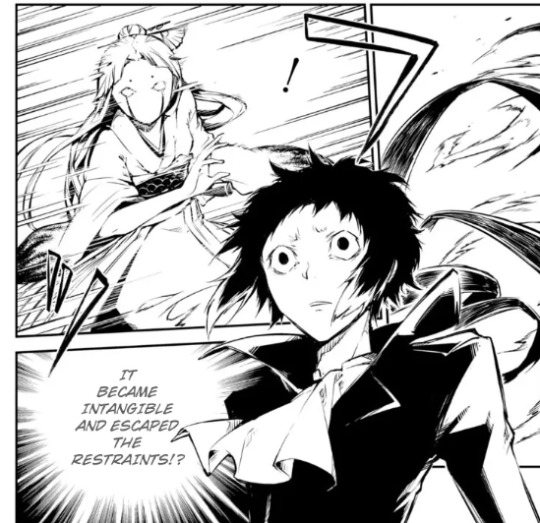
She has shown new tricks while fighting Akutagawa, which hints at the fact she is slowly making Demon Snow her own ability. Let’s underline, for example, that among her likes there are ghosts and that she has become able to make Demon Snow intangible.
This struggle to make Demon Snow her own and at the same time to better understand it (and so to better understand her past and herself) is perfectly illustrated thanks to the symbolic use of Kyoka’s phone:
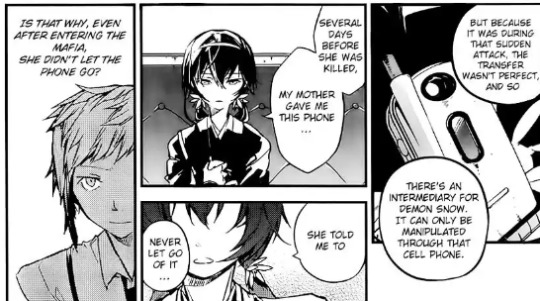
This phone was given to Kyouka, so that she could call her mother if she needed. So the fact that the demon can only be controlled through that phone underlines two things aka her being unable to overcome her parents’ death and her dependance on others guiding her.
In short, Kyoka is a child who is in desperate need of guidance, but is in an environment where she is manipulated. After all the two people who use the phone are Akutagawa aka his superior and Koujo who is basically a motherly figure. They are two people who have authority when it comes to Kyoka and are supposed to guide her, but fail to do so.
For Kyoka to grow she needs two things.
She needs to assert her individuality:
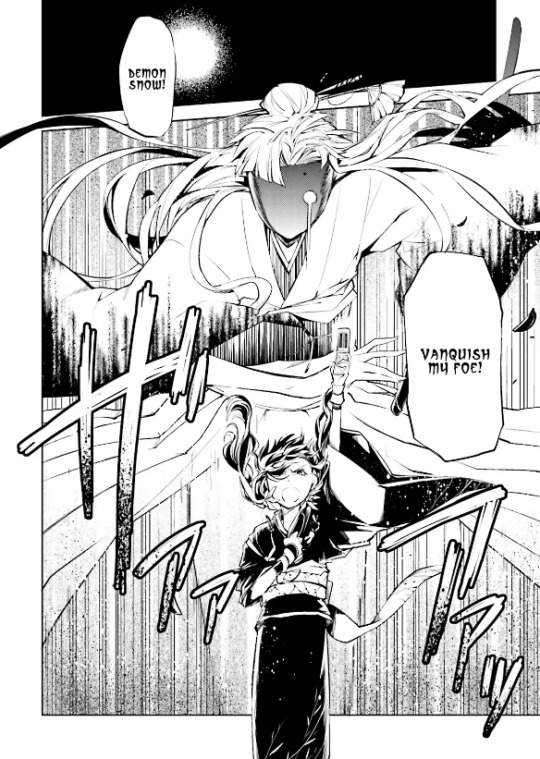
She needs a safe place where she can nurture this new found and frail sense of self.
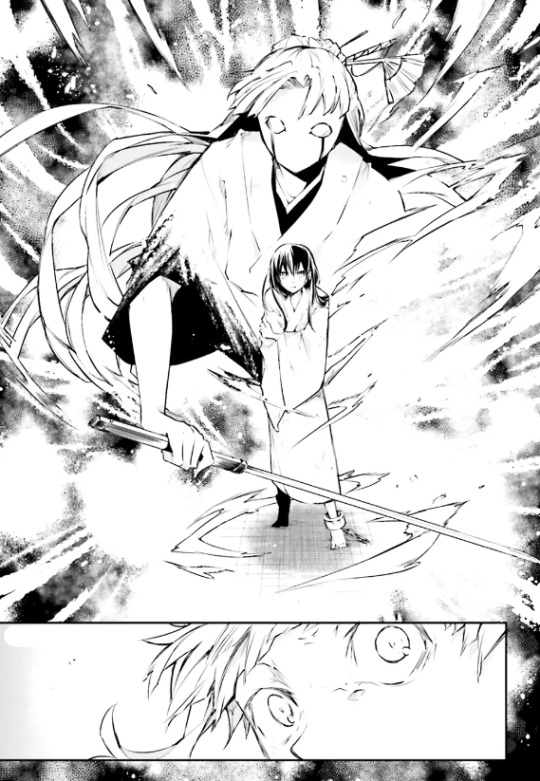
As a matter of fact, one can’t expect a child to save herself no matter how much willingness she has.
This is where the agency and Fukuzawa come in:
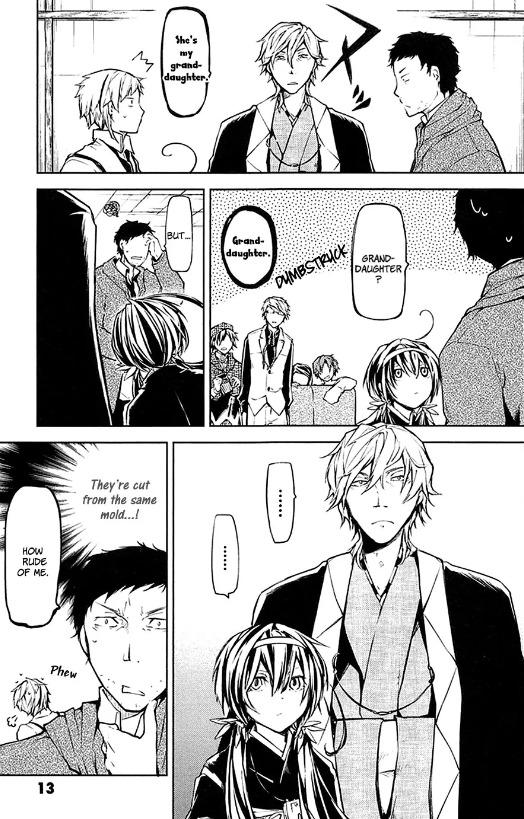
Fukuzawa is a mentor/father figure for the members of the agency and basically adopts Kyoka on the spot. Let’s highlight that his ability is perfect for a father figure since it works by firstly accepting a person as a member of a group (a “family”) and then by letting this person gain a major control on their gift. Let’s add that to be accepted a person must show to hold some ideals and that the control given changes from individual to individual. These conditions describe the agency pretty well. All in all the agency is a place where different people sharing a desire to help others meet and are given the chance to be themselves.
Fukuzawa’s ability which supports instead of controlling takes the place of the phone and gives Kyoka the chance to grow.
As previously stated many other characters will have to take similar steps into overcoming their parental figures’ legacies.
In a sense, Cannibalism is an arc which perfectly shows both this and the fact that almost all the characters are far from succeeding, as for now.
In Cannibalism the leaders of the two organizations are out of commission. However, the two people who are supposed to temporally lead the two groups fail in almost opposite ways. Chuuya is too aggressive in his leadership and ends up in a trap because of his personal feelings, whereas Kunikida’s leadership is too weak. After all, by the end the majority of the agency prefers to fight the mafia head on together with Ranpo instead of continuing the investigation with Kunikida. And even when it comes to the investigation it is Atsushi the one who insists on it while Kunikida can’t choose between the two options given to him. We can say that Chuuya doesn’t consider other options and so doesn’t think enough, while Kunikida thinks too much to the point that he is stopped in his tracks.
What is more, the arc makes perfectly clear that both Chuuya and Ranpo are two people who still depend a lot from respectively Mori and Fukuzawa aka the adults who took them in as kids and that they see as role models. It is because of this that the two fight and this almost leads to the destruction of the city and of both organizations.
Finally it is interesting that even Mori and Fukuzawa fall into the trap and they too need the intervention of their former teacher to stop:
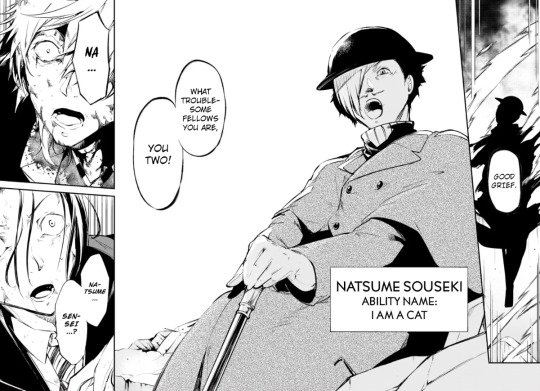
LOVED ONES AND THE GREATER GOOD
Finally I would like to discuss briefly a foiling introduced in the Guild arc, but still ongoing and which will probably be important later on.
I am talking about the foiling between Mori and Fitzgerald.
As explained above Mori is a character whose philosophy is built around the idea that he is doing what he is doing because of the greater good. The section dedicated to him highlights some contradictions between this idea and Mori’s actions, but the imporant thing here is to recognize that this is the narrative Mori builds.
Fitzgerald tells himself a completely different one:
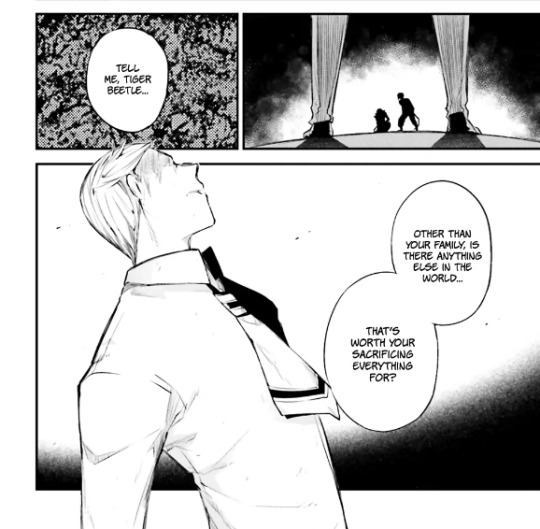
He is doing what he is doing for his own family and subordinates.
Let’s highlight that, while Mori affirms he will discard people to obtain a positive result for the city, Fitzgerald is ready to completely destroy Yokohama if it means his subordinates won’t have to suffer anymore.
However, Fitzgerald is just as contradictive as Mori is. After all, by the end of the Guild arc many of his subordinates have suffered because of him.
Lucy has been treated coldly just because she failed one mission.
Mitchell is in a coma and Hawthorne called Fitzgerald out on this.
Steinbeck resents Fitzgerald because of his actions.
Melville lost Moby Dick.
All in all we can say Fitzgerald did a pretty poor job when it came to him taking care of his comrades.
However, he has been clearly set up for redemption and it is clear that his way to climb back up consists in him facing his former subordinates (like Hawthorne, Mitchell and Steinbeck) and saving them.
Mori on the other hand has not been set up for redemption so far and the current arc has (so far) given more focus on his darkest tendencies.
We’ll see where they go, but as for now, it is interesting that they are basically opposite and that their extreme behaviours are both portrayed as wrong exactly because they are extreme.
Tossing people away when they are not useful anymore can’t lead to the greater good, but only caring about a bunch of loved ones and being utterly dismissive of others isn’t the right option.
The ADA is depicted as an organization which is in the middle. On one hand they are meant to help people and society. On the other hand they treat each other like family. The point is not about choosing between loved ones and the greater good, but rather to find an equilibrium between them.
Wishing to follow an ideal and creating bonds are both human needs and they must be recognized as such in both their beautiful parts and their limits. It is especially important to be conscious that each one of them can lead to disaster if it is not balanced by the other.
This is what Fyodor is trying to do with his schemes after all.
Both in Cannibalism and in the Decay of Angels arc Fyodor is taking things dear to his targets and twisting them, so that they become the reason why chaos happens.
In Cannibalism he targets the two leaders of the mafia and of the ADA knowing that their subordinates will be willing to do all they can to save them and that the two leaders as well will act to protect their subordinates.
The characters are so lost in Fyodor’s manipulation that Natsume himself needs to come back to remind his mentees the core idea of the tripartite tactic aka a strategy born to preserve the peace of Yokohama.
In the current arc what Fyodor is targeting is the ideals of both the Agency and of the Hunting Dogs.
Both organizations want to fight injustice and to protect people. However, it is precisely because of this that their members are easily manipulated:
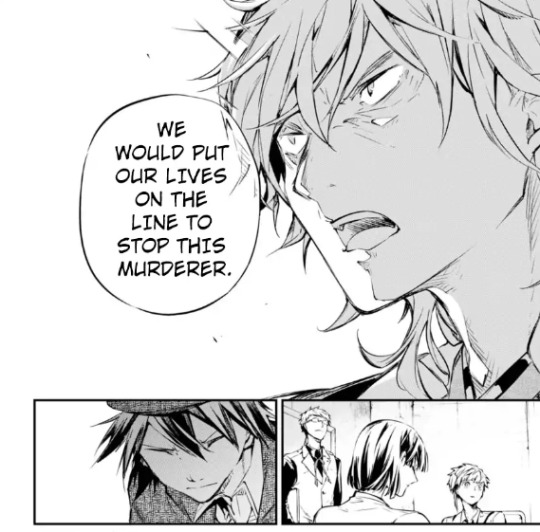
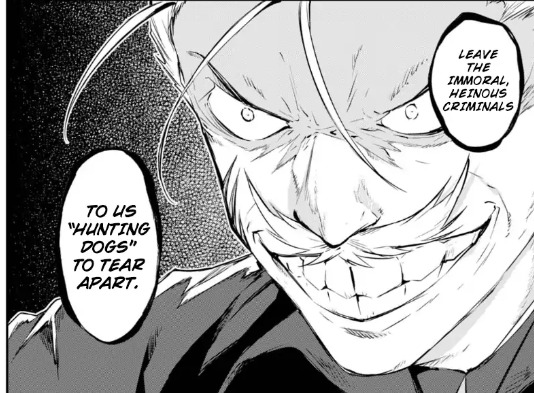
The agency had been advised beforehand to refuse the job, but they still take it and this is why they fall in Fyodor’s trap. If they had just accepted for once to let someone else save the hostages or if they had worked more closely with the police they could have avoided the Decay of Angels’ set-up.
Similarly the Hunting Dogs are so obsessed by the idea that they are the heroes who should punish criminals that they don’t even realize that the people they are trying to kill are innocent. They are so sure to be the right side that they can’t see that they have become pawns of that same criminal organization that they are supposed to stop:
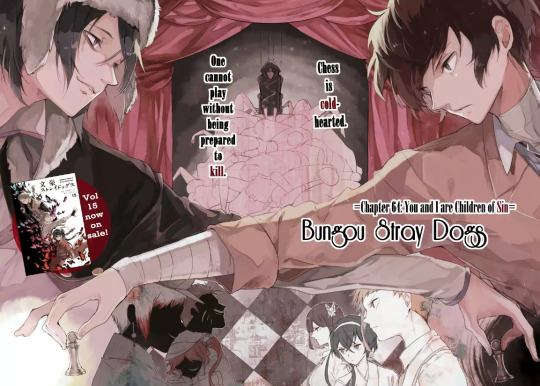
All in all this is a perfect strategy for an organization called the decay of angels because it uses people’s desire to be in the right and it twists and taints it.
However, if the previous arc was solved thanks to the acceptance of having to fight together for a greater good, this arc will probably show the importance of people’s feelings:
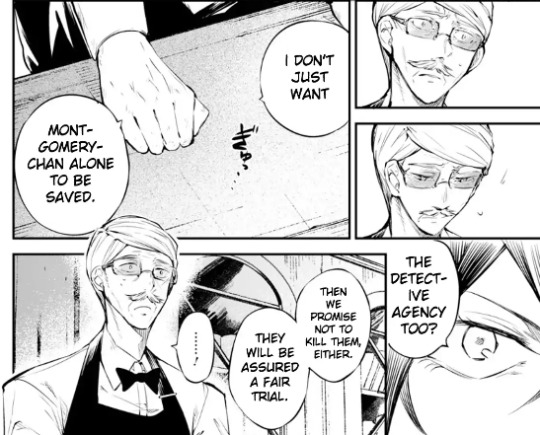
All in all, the people who know the detectives are sure of their innocence and this is true not only for their friends and allies, but also for their former enemies:
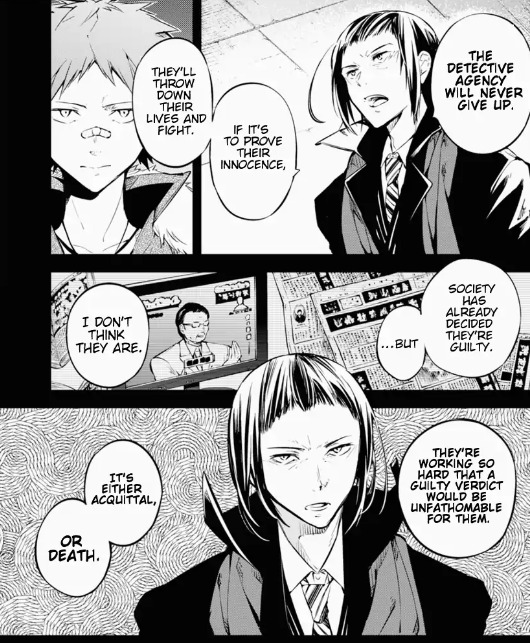
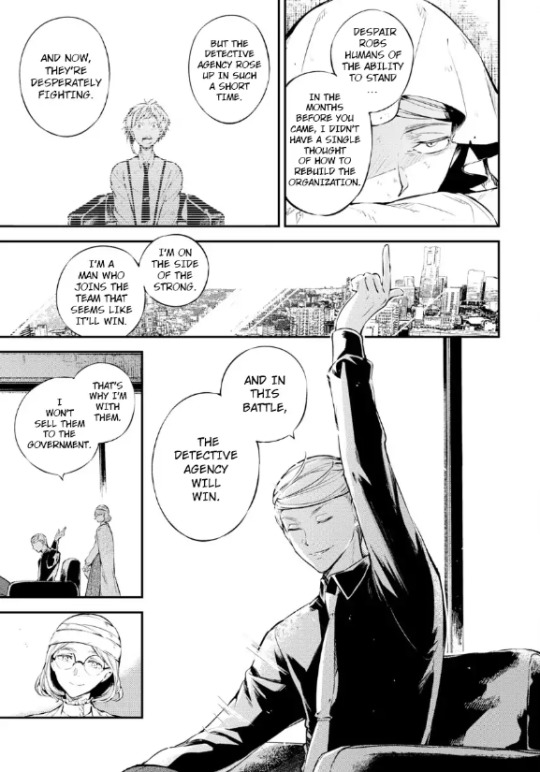
This highlights the importance of getting to know people instead of quickly condemning them and it also ties with another fact.
Despite the fantastic worldbuilding element of a book which can turn fiction into reality, the point of the arc is that the ADA is victim of a false narrative which paints them as criminals. It is something which can happen in the real world too despite the lack of magic and special abilities. The reason why this narrative is so quickly accepted is not just that the book is playing with everyone’s heads, but also this:
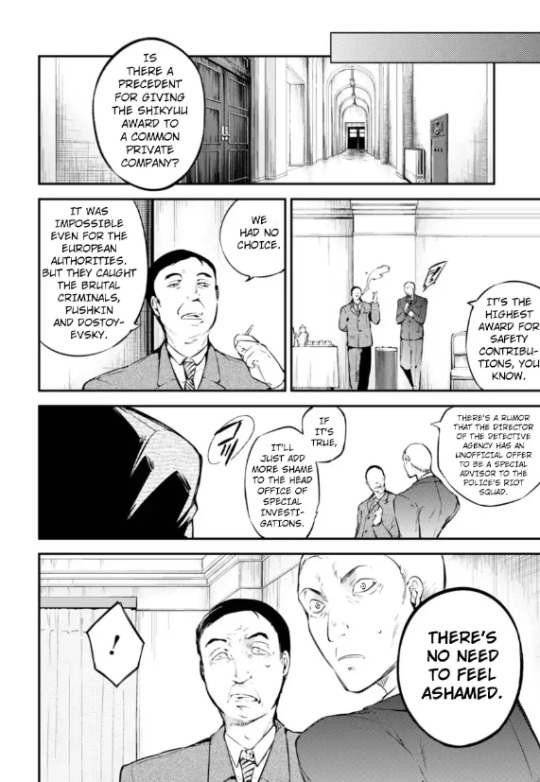
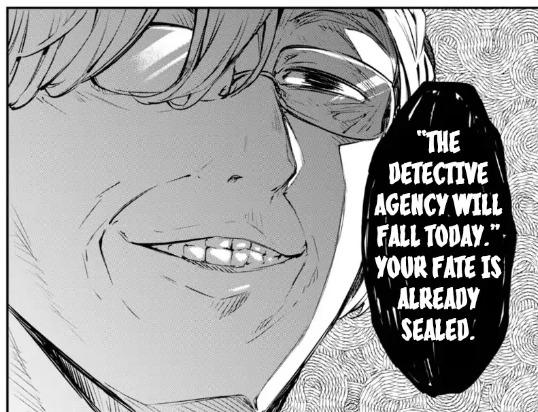
The police and some politicians have been resenting the agency since before and have been trying to destroy it. This is because all in all the agency is made by a bunch of people society wanted to discard. However, they found a place who accepted them and showed society they could be of help. Despite this, a part of society is still suspicious of them, of their abilities and of their past crimes. This is why they are all so quick to accept the narrative built by Fyodor no matter how many times in the past the agency helped the police or the country.
In short, the current arc is also an arc where society is criticized as an imperfect structure. At the same time, the ADA finds itself once again between two organizations with opposite beliefs.
On one hand the Hunging Dogs have chosen to follow society rules and orders without nuance. On the other hand the Decay of Angels is a group of terrorists who want to destroy society.
The ADA will probably find a happy medium between the two stances which are both being criticized by the narrative.
CONCLUSION
This analysis tried to outline some recurring themes in the story and some characters used to explore them. It also tried to show some connections among the major arcs we have had so far.
As a summary I would say that the themes discussed are the following ones:
1) The necessity to integrate with the parts of one-self an individual refuses to aknowledge. This is true also for society in general.
2) The necessity to find an equilibrium between feelings and rationality, people and ideals.
3) The necessity to grow up and to make oneself independent from one’s parents. This can also lead to a better understanding of one’s parents as well since it lets the individual see them like their own people instead than simply their parents.
#bsd#bsd meta#atsushi nakajima#lucy maud montgomery#mori ougai#kyoka izumi#akutagawa ryunosuke#bungou stray dogs#my meta#fitzgerald bsd
164 notes
·
View notes
Text
Why I don’t believe in chapter 671
Okay. Maybe this is not what it is.
Might contain spoiler of the latest chapters. Pass at your own risk.
Bad writing and chapter analysis (maybe it’s not even one) ahead.
After the release of the English translation of gintama chapter 671 majority of the fandom whom were previously shook by the appearance of Shinpachi’s “supposedly” child is currently shook by the “death” of Okita Sougo. At least most of the people I knew are.
/CAN I HAVE THIS MOMENT TO RANT HOW ADORABLE TAMAKO IS/
Cough cough lets not get out of topic shall we.
Reason #1: The whole chapter itself was very comical. What with the unexpected turn of event ( I personally didn’t see Tama getting mixed up into the FF phenomena) and the usual Shinpachi cherry boy thingy.
Reason #2: Guys, its Zura (Zura janai Katsura da). Although he looks really good with that moustache, I still cannot take him seriously (now more than ever) and what he had done to the top officials of the shinsengumi.
Reason #3: We’ve seen Kondo-san in the previous chapter and Shinpachi stated that he had been coming frequently to his and Otae’s place to practice his new job. Unless the gorilla was not informed of the situation in the shinsengumi, I dont think he should be there at all while his families are being threatened (by the new Era). Therefore, the whole demotion, resignation and seppuku either did not happened or had not happened yet - the latter we still have hope.
Reason #4: The shinsengumi isn’t the type to lose. Not to Zura anyway. They’ll return. The more I think the possibility that they won’t, the more ridiculous it sound.
Yamazaki might be alive too.
Reason #5: After the long chapters on the war with Utsuro, I have always believed that Gintama will go back to the way it used to be before the start of the war. In a different way that is.
Characters are returning one by one albeit the change in appearances and roles. Zura and the shinsengumi (top brass) somewhat have a reverse in roles.
Shinpachi is finally working on his initial dream of restoring his father’s dojo while carrying out the legacy of the yorozuya ( I cried) and also notice how the manga now focuses on his POV as like the first chapter of gintama.
What I believe Sorachi is currently doing is to set them all back up to the early (ancient) chapters; to build the Edo after the war -which we can already see undergo alot of changes moving to a new Era. This Edo however remains the Edo that these people (bless them) still want to protect in their own ways.
Just as Utsuro had told Gintoki, there are consequences of the war and all these happenings are some among many others. Also notice that albeit the gloomy mood surrounding the chapters, there are little happiness that we can be grateful for. So why would the shinsengumi of all people be cast to such misfortunes.
The yorozuya will come back. The shinsengumi will come back to run alongside them and protect their new Edo. Zura is scheming something if not just his idiocy again. Sougo is probably faking his own death and starting his own Bakaiser Empire to go against Zurump (cause why not?).
Some things are undeniably changing but some thing just remained. And for me, this very foundation would be how Sorachi would wrap up gintama- at least that would be really nice.
If any of these doesn’t convince you, let’s recall Sorachi’s way of trolling. Let’s recall that shinsengumi (and particularly Sougo cause I know alot are worried for him) are main secondary characters in gintama- they don’t deserve such tragic, unexplained ending. They’ll return or at the very least brought back up gintama style.
/Excuse my poor writing/ also these are just my thoughts/ Then again Sorachi is good at the unexpected. Until then we shall wait.
Nobume smoking cigar with her legs on the desk (and donuts) is my favorite new thing.
16 notes
·
View notes
Text
Ruth
The story of Ruth begins with her association to Naomi, Elimelech’s widow. As she proves her loyalty to her, she meets the kind hearted man, Boaz. The rest is history.
[ genre: nonfiction, biblical ]

Famine has hit Bethlehem and everyone is forced to evacuate. And so Elimelech, father of two sons, and husband of Naomi, becomes worried. They decide to move east, towards the country of Moab. And in Moab, they lived. Time passes and Elimelech dies, now Naomi is left with her two sons, who both marry two local girls, Ruth and Orpah. Everything is going well for the family, at least it seems that way for now. Soon after, Mahlon and Kilion, the two sons, also pass away. This leaves Naomi husbandless and sonless but she is not alone, for she had her two daughter-in-laws.
Ruth’s POV:
My husband, his brother, and his father are all dead. I’m now left with my mother-in-law and my sister-in-law, all man-less. Yes, I am not alone, but seeing that we are left with no man? This was going to be a struggle for sure. Naomi decides that it would be best to return home. Orpah and I pack our luggage and ready ourselves to head to the land of Judah. However, Naomi tells us goodbye. But what is this? We are left alone and she tells us to stay behind? I am not one to leave such a kind woman alone, nor do I want to be alone myself. Naomi has done me and Orpah good, it was only right that I stay with her. So despite her attempts to urge me to stay, my loyalty stands to grow only to become more firm. “You must leave, the both of you, for there is no sense in staying with me. I am no longer capable to bear sons that are to be your husbands, and even if I were, would you wait for them to grow old enough to become your husbands? Of course not, for that would be foolish. Leave, and I will pray for God’s kindness upon you both. You have both shown true kindness to me and my family. May the Lord bless you,” she said. But no, I could not let this happen. “Goodbye, dear Naomi. May the Lord show his mercy upon you and your kind heart,” Orpah says as she kisses Naomi goodbye. I cannot fathom how Orpah could just leave but I know that Orpah leaving only made my will stronger. I tell Naomi that I am to stay by her side. Wherever she would go, that’s where I would want to be. Wherever she would stay is to be where I will stay too. I was more than determined to go back with her to her people.
Naomi’s POV:
My sons are gone, and all they have left me are their widows, Ruth and Orpah. I determined that it would be best for me to go back to Bethlehem. I say goodbye to Ruth and Orpah. I see that a future for these two ladies, and I do not want to ruin their opportunities. Orpah kisses me goodbye, and it pains me to leave these women behind. However, Ruth never ceases to surprise me once again. “No, Naomi. You have done me good throughout the time I have been part of your family. I will not leave you. Your God is mine, and I wish to be a part of your life,” Ruth said. This melted my heart, Ruth is a good woman, and she truly did good to my family. Who was I to reject such a woman? Because of this, I’m convinced to bring her along to Bethlehem. And so we reach Bethlehem, and even if 10 years had passed, they somehow still recognize me. As we arrive, a woman exclaims “Can this be Naomi?” But no, I could not bear to be known as the same woman I was 10 years ago. God has forsaken me, therefore I shall be a new person. “Call me Mara,” I reply to the woman. “I find no sense to be called Naomi anymore, for the Almighty has brought misfortune upon me. Please, call me Mara,” I tell the women. Just as I predicted, it’s not easy for us. I think I’m undergoing depression. I haven’t been in my best mood lately, and everyday just doesn’t seem to get better. All I can hope for, is a better future for Ruth, for I know my chances at this are lost. One day, Ruth approaches me and asks to work in the fields. The barley harvest has just begun, and so I tell her to go forth, and glean as she wishes.
Ruth’s POV:
And so Naomi finally agrees to let me go with her. It was hard times for us both, and the only opportunity I could find is to set out and work in the fields. My husband would not have liked the idea of me working in a field, gleaning behind harvesters. Oh how I miss him. Suddenly, a man approaches the harvesters and greets them. Oh, this man. I will never forget how he looks. A few meters away from me, I could see his eyes dazzle as the sunlight hit his pupils and cheekbones. He notices me, and asks the harvesters “Who does that young woman belong to?”
They answer him, saying that I was the Moabite that Naomi brought back from Moab. They tell him how i have come here, and begged to glean behind the harvesters, and of how I had little rest for that day. The man is kind-hearted and he shows mercy upon me. He tells me, “Do not go away from me, and work for me. The men, they shall not lay a hand on you. Drink water from their jars which they have filled whenever you are thirsty.”
This man is more than just kind hearted, he is generous and good in nature. I bow down to him and ask “Why would a man so rich like you, be kind to a foreign stranger like me?”
He replies, “I have been informed of your story with Naomi. You have done well in serving Naomi since her husband’s death. I have heard that you left your family behind for her, to stay in a city you have not known before, with people whom you also have not yet encountered before. For that, I wish that the Lord will bless you, that you will be rewarded for your good deeds, for you have taken refuge in the Lord.”
“May I continue to find favor in your eyes, my lord,” I reply. “You have put me at ease by speaking kindly to your servant—though I do not really have the standing of one of your servants.”
Mealtime comes, and the kind man, whose name i have learned is Boaz, approaches me and invites me over to have bread with him.
Boaz’ POV:
I had just returned to my field to check on my harvesters. The first thing that catches my attention is this beautiful woman, whom i do not recognize. I have never seen her before, but there she was, gleaning behind one of my harvesters. Though gleaning is not exactly an easy task, I observe her do it with utmost grace. This woman is unlike any woman i have encountered before. She has a unique type of beauty, and certainly she stands out for me.
Immediately, I ask the harvesters who that woman is. One of them answer me, “She is the woman that Naomi came with, form Moab.”
So she is Ruth. I’ve heard of her story with Naomi, for she was Elimelech’s wife, and Elimelech was my relative. From this, I realize that I have great responsibility to take care of this woman, and I was more than glad to be caring for such a beautiful one. I tell her to work here for good, not looking to work at any other field. I warn my men that Ruth is not to be touched, and that they are to let her drink from their jars. Of course, she was grateful for these favors. She bows down to me and asks why I had chosen to help a foreigner like her. And at last, I tell her that I am aware of her good works, of her loyalty to Naomi after her husband’s death, and that I wish only for her to be showered with God’s blessings, for I knew she deserved it.
Mealtime comes, so I invite the young woman to eat. “Have some bread and dip it in the wine vinegar.” She sits down with the other harvesters as I even offer her some roasted grain. She eats as much as she wants, and still, there were leftovers. When she finishes, I order my men, “Let her gather among the sheaves and don’t reprimand her. Even pull out some stalks for her from the bundles and leave them for her to pick up, and don’t rebuke her.”
After that, Ruth gleans the entire evening. She threshes and threshes all the barley, until it finally reached a whole amount of an ephah.
Ruth’s POV:
And after I gleaned the entire evening, I decide to go home. I show Naomi what I have gleaned, and even give her my left overs from mealtime. She immediately asks for whom I gleaned for. I answer her “The man’s name is Boaz.”
“May the Lord bless that man, for he has showed you kindness!” she tells me. “That man is a close relative of ours, one of our guardian redeemers. It will be good for you to work for Boaz, for I know he will surely take care of you, and in someone else’s field you might get harmed.”
So I follow. I remain working for Boaz until the harvests finish, and every night I come home to Naomi. However, one day, Naomi tells me that she should find a home for me, and continue to give me very specific instructions to follow. She tells me that Boaz is going to be winnowing barley on the threshing floor. So I put on perfume, wear my best clothes, go down to the threshing floor, wait for him to lie down, and finally, i lie down at his feet.
Boaz’ POV:
One night, I am eating and drinking with the harvesters on the threshing floor. I am having a great time, but now I feel tired so I decide to rest and lie down at the far end of the grain pile, where no one might disturb me. However, in the middle of the night, I feel a sudden warmth on my feet, and I then wake up to a woman lying at my feet! I immediately ask her “Who are you?”
“I am Ruth, your servant” she replies. “Spread the corner of your garment over me, since you are a guardian-redeemer of our family.” Of course, I was willing to help such a kind woman, I fancy Ruth and her kind heart and graceful ways. This is my chance to take Ruth as my wife. However, I know that I was not in the rightful position to instantly take her, for sadly, there is another man who was a closer relative than me. I explain this to her, and tell her to wait there until the morning, which she does. However, she gets up before anyone could be recognized, and I tell my men that no one must know that a woman came to the threshing floor.
I come over and call the guardian-redeemer, as well as ten elders as witnesses. I tell him, “Ruth from Moab, is selling the piece of land form Elimelech, our relative. If you shall not buy the land, then I will.”
“I will buy it,” he says.
“If you buy the land, know that you are also acquiring Ruth, in order to maintain the dead’s name with the property,” I say. At this point, I’m hoping he will change his mind.
“I cannot do it, for it might endanger my own estate.”
I cannot do it, he said. I’ve never been happier to hear four words. And so I say “oday you are witnesses that I have bought from Naomi all the property of Elimelech, Kilion and Mahlon. I have also acquired Ruth the Moabite, as my wife so that the name of the dead will not disappear from among his family or from his hometown. Today you are all witnesses!” The elders and people at the gate then give us their blessings.
I took Ruth home as my wife, and made love to her. Our love then bore a son and we named him Obed. Obed then fathered Jesse, who fathered David.
0 notes
Text

! FURACÃO K , LINHA DE DESENVOLVIMENTO.
abaixo, ficará registrado todo o desenvolvimento de katrina dela cruz; muito mais para controle da player ou para aqueles que gostam de acompanhar os acontecimentos ao longo do jogo. * link fixado na biografia.
TASK.
( TASK 01 ) DIÁRIO DOS SEMIDEUSES. questionário sobre as preferências de katrina. leitura aqui.
( TASK 02 ) A MISSÃO MAIS IMPORTANTE. katrina retorna até a sua segunda missão, onde de quatro semideuses que foram, apenas dois retornaram. participação especial de @kerimboz como sendo a outra pessoa que retornou com vida. leitura aqui.
( TASK 03 ) DEFEITOS FATAIS. os semideuses precisaram confrontar seus maiores medos, o de katrina sempre foi morrer queimada, além de saber que nunca será amada, sendo por sua própria incapacidade. leitura aqui.
POV.
YOU SAVED MY LIFE. katrina precisa se despedir de seu primeiro amor para chegar no acampamento, mas naquela noite, também o perde assassinado por um inimigo que fez nas ruas. leitura aqui.
NIGHT OF THE HUNTER. após quase onze anos ela consegue vingar-se por seu amado, matando aquele que havia o tirado a vida. leitura aqui.
BLESSING AMONG MISFORTUNES. benção de nêmesis. após vingar-se, a deusa surge em sonho para lhe abençoar. leitura aqui.
OFICINA DE HEFESTO, WATERLAND. katrina confeccionou uma adaga, a qual havia sonhado com ela e que mais tarde, conseguiria turbinar para que veneno corresse nela. leitura aqui.
TEMPORADA NO SUBMUNDO.
#todas as interações no submundo, podem ser encontradas AQUI.
UNDERWOLD. katrina caiu no submundo, perdeu um amigo e precisa lidar com um grande inimigo lá embaixo. leitura aqui.
#HEADCANNON 01. as primeiras impressões.
WINGED ANGEL OF DISCORD. durante um ataque, katrina perde o controle dos poderes e um novo surge. leitura aqui.
#HEADCANNON 02. o segundo dia.
#HEADCANNON 03. hades convida.
PRÓXIMOS DO FIM. katrina reencontra dois amigos no submundo. leitura aqui.
12 notes
·
View notes